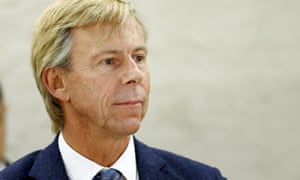Anders Kompass was frustrated by the United Nations’ failure to act over abuse by peacekeepers in Africa

Anders Kompass, member of staff at the United Nations Office of the High Commissioner for Human Rights. Lack of accountability is entrenched in the UN, says Anders Kompass. Photograph: Denis Balibouse/Reuters
Sandra Laville
A United Nations whistleblower who was suspended for exposing the sexual abuse of children by peacekeepers has resigned over the organisation’s failure to hold senior officials to account.
Anders Kompass, director of field operations at the UN human rights office in Geneva, announced his resignation on Tuesday. Kompass – whose suspension last year for exposing the sexual abuse of children in Central African Republic was revealed by the Guardian – said he could no longer work for an organisation with no accountability.
“The complete impunity for those who have been found to have, in various degrees, abused their authority, together with the unwillingness of the hierarchy to express any regrets for the way they acted towards me sadly confirms that lack of accountability is entrenched in the United Nations. This makes it impossible for me to continue working there.”
Kompass announced his resignation five months after a report commissioned by Ban Ki-moon into the scandal completely exonerated him for sharing confidential documents that revealed children as young as eight and nine were being raped by peacekeepers in the Central African Republic.
Kompass passed the information to French prosecutors after becoming frustrated that nothing was being done by the UN to stop the abuse.
Kompass’s resignation comes after one of the key senior UN figures involved in his suspension in April last year announced last month her intention to seek the position of UN secretary general when Ban stands down at the end of this year.
Susana Malcorra, then chief of staff to Ban, was criticised by a panel of inquiry last December into the Kompass case for mishandling the affair. Malcorra quit the UN to take up a post as foreign minister in her native Argentina a month before the panel inquiry report into the Kompass scandal was published.
It vindicated Kompass and attacked the “gross institutional failure” of the UN, whose officials had refused to respond to the allegations that peacekeepers were sexually abusing children in CAR. The report said initial complaints in 2014 were “passed from desk to desk, inbox to inbox, across multiple UN offices, with no one willing to take responsibility”.
UN Watch, a human rights body in Geneva which monitors the UN, called for Ban to mount an inquiry into the UN office for human rights in the light of Kompass’s resignation. Hillel Neuer, executive director of UN Watch, said Moon and UN human rights chief Prince Zeid bin Ra’ad needed to apologise fully to Kompass, who had been a “hero” for trying to protect abused children “in contrast to other UN officials, including at the highest levels, who did everything to protect both governments and their own careers”.
“The UN keeps saying their policy is ‘zero- tolerance’ yet what we see from the top down is the opposite: a neglect of the women and children who are abused by peacekeepers and a policy of giving impunity to the abusers,” said Neuer.
Kompass was suspended in April last year after being accused of leaking confidential UN documents and breaching protocols. He passed a report on the abuse of children in CAR, mostly by French peacekeepers, to the French prosecutors, who then began an investigation.
The report had been commissioned by the UN office of the high commissioner for human rights after reports on the ground that children, who are among the tens of thousands displaced by the fighting in CAR, were being sexually abused.
Entitled Sexual Abuse on Children by International Armed Forces and stamped “confidential” on every page, the report detailed the rape and sodomy of starving and homeless young boys by French peacekeeping troops who were supposed to be protecting them at a centre for internally displaced people in Bangui, capital of the Central African Republic.
The Guardian reporting on the case prompted international outcry over the treatment of Kompass, which sparked Ban to instigate a panel of inquiry led by a Canadian judge.
That inquiry fully exonerated Kompass, and in January this year he was told an internal disciplinary hearing had also cleared him.
In an interview with the Guardian this year after being exonerated Kompass said even once he had been cleared his life at the UN had become very difficult.
“Now that it’s over, it keeps being very difficult for me. No one has said anything to me, no one has apologised to me. I think many of us expected they might do so particularly after everything that has happened. But nothing has been said, and I probably just have to accept that, although it is very disappointing.”
No comments:
Post a Comment